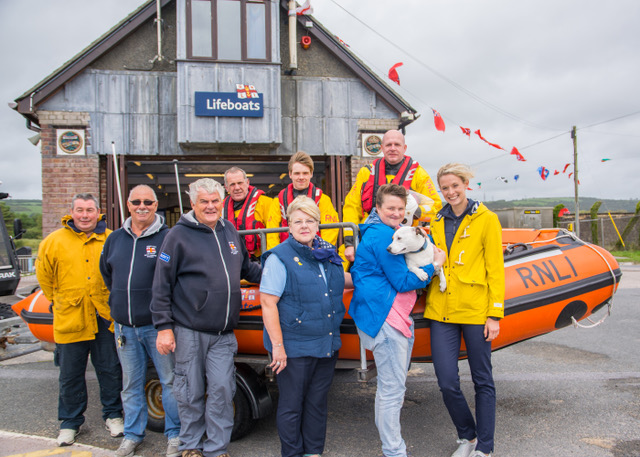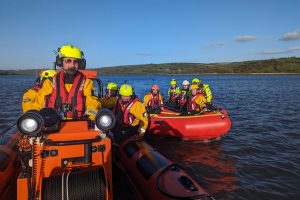
THE RNLI has launched a pilot partnership with national veterinary group Vets4Pets, to support its on-going Respect the Water campaign.
The partnership will initially focus on Wales and enable both organisations to support water safety messages, for local people and their pets.
As part of the pilot programme, Welsh lifeboat stations will work closely with Vets4Pets’ 22 practices, which includes two Companion Care surgeries, throughout the country, to focus on a key group of users which the RNLI has identified as being at risk when on or near the coast – dog walkers.
Helen Church, the RNLI’s community safety partner for Wales and West, said: ‘This pilot partnership is a brilliant opportunity to work with an organisation that in many ways is similar to the RNLI.
‘Vets4Pets practices are distributed throughout Wales, provide a vital service and are an intrinsic part of their local community.
‘We know dog walkers are an ‘at risk’ group when walking their pets around water and the coast, which means Vets4Pets is an ideal partner for us as we continue to deliver water safety messages.
‘Vets4Pets are experts in pet welfare and their strong relationships with pet owners will be a key asset in teaching dog walkers about our Respect the Water campaign.’
The partnership will see RNLI lifeboat stations joining forces with their local Vets4Pets practice, to provide support for work each other does in the local community.
This will include tailoring First Aid pet workshops to include water safety messages and vets and vet nurses advising RNLI volunteers on how best to handle pets they have rescued.
Karlien Heyrman, vet and clinical services manager at Vets4Pets, said: ‘The RNLI are a fantastic organisation whose volunteers work selflessly and tirelessly to keep people, and pets, safe around the waters of the UK.
‘We’re delighted to be launching this partnership to help the RNLI increase awareness of water safety to our clients and hopefully play a role in preventing unnecessary incidents involving pets and their owners getting into trouble in the water.
‘Vets4Pets practices are all locally owned and are passionate about being part of their local community and by partnering with their local RNLI lifeboat station, it can only add benefit to clients and their pets.’
Prevention is key for the RNLI – helping people by providing communities with the skills and knowledge to keep themselves and their pets safe around water and when they visit the coast.
‘Sadly more than 200 walkers have died since 2011 around our coast, many when walking their dog and our annual Respect the Water drowning prevention campaign helps us to focus on advising people to give water the healthy respect it deserves,’ added Helen.
‘While we will always answer the call for help, myself and everyone within the RNLI would like to see people thinking more about their safety before and during their visit to water and the coast.
‘A key message we’ll be working on with Vets4Pets, is to convey to pet owners that we would not encourage people to enter water to save pets. More often than not, the person themselves can get into danger, further escalating the jeopardy and the need for a rescue.
‘Instead, people should call the Coastguard on 112 or 999 when at coastal locations or 112 or 999 and ask for the Fire and Rescue service when at any inland waterside location. The RNLI will attend a pet in distress.
‘As we move into the peak holiday season around the UK, this partnership with Vets4Pets will help deliver key water safety messages to a relevant group of people and hopefully help save lives.’
Dog owner Jan Godfrey-Coles knows all too well the importance of water safety when walking a dog on the coast.
Jan was taking her four-year-old Staffie cross Blodwen for her regular beach walk at Burry Port on a low tide last month (July). Blodwen loves splashing in and out of the water, but this time her exuberance got her into trouble as the strong currents off Burry Port on lower tides swept her out away from the shore.
Before Jan knew it Blodwen was swept a long way out and, unable to swim against the current, was getting further and further away from her desperate owner.
Jan immediately called 999 and asked for the Coastguard, who requested the launch of Burry Port RNLI’s D class inshore lifeboat Diane Hilary and its volunteer crew.
Jan said: ‘Panic had set in and by now Blodwen was a good 60-70m from the shore. I was considering swimming out to try and rescue her as I thought I was going to lose her. Then I saw the lifeboat crew racing towards Blodwen. It was only minutes after I made the 999 call and I was so glad they were on their way to get her.’
The charity’s lifeboat crew quickly reached Blodwen, who by this time was tired and cold, brought her on board the lifeboat and took her ashore to be reunited with a delighted Jan.
‘The lifeboat crew were fantastic,’ she added.
‘I was so well looked after and I can’t thank them enough. Not only did they save Blodwen but their presence also prevented me from trying to swim out to her and potentially putting myself at risk.
‘As a dog walker I take Blodwen to the beach all the time, but water safety never used to be a major consideration for me. I think it is fantastic that the RNLI is teaming up with Vets4Pets to promote vital safety tips to as many dog walkers as possible.’
Alun Wells, Deputy Launching Authority for Burry Port RNLI, said: ‘Jan did what we would encourage any dog walker to do if their animal gets into difficulty on or near the sea – call 999 and ask for the Coastguard.
‘It can be tempting for dog walkers to enter the water and attempt to rescue their beloved animals, but by doing so they can put themselves in serious danger.’

















Add Comment